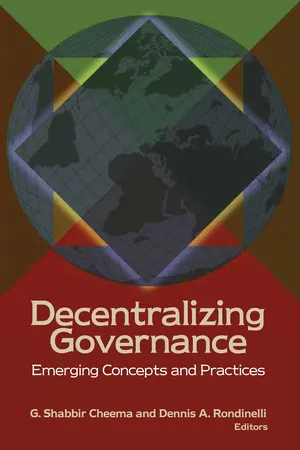
Decentralizing Governance
Emerging Concepts and Practices
- 326 pages
- English
- PDF
- Available on iOS & Android
About this book
A Brookings Institution Press and Ash Center for Democratic Governance and Innovation publicationThe trend toward greater decentralization of governance activities, now accepted as commonplace in the West, has become a worldwide movement. This international development—largely a product of globalization and democratization—is clearly one of the key factors reshaping economic, political, and social conditions throughout the world. Rather than the top-down, centralized decisionmaking that characterized communist economies and Third World dictatorships in the twentieth century, today's world demands flexibility, adaptability, and the autonomy to bring those qualities to bear.In this thought-provoking book, the first in a new series on Innovations in Governance, experts in government and public management trace the evolution and performance of decentralization concepts, from the transfer of authority within government to the sharing of power, authority, and responsibilities among broader governance institutions. This movement is not limited to national government—it also affects subnational governments, NGOs, private corporations, and even civil associations.The contributors assess the emerging concepts of decentralization (e.g., devolution, empowerment, capacity building, and democratic governance). They detail the factors driving the movement, including political changes such as the fall of the Iron Curtain and the ascendance of democracy; economic factors such as globalization and outsourcing; and technological advances (e.g. increased information technology and electronic commerce). Their analysis covers many different contexts and regions. For example, William Ascher of Claremont McKenna College chronicles how decentralization concepts are playing out in natural resources policy, while Kadmeil Wekwete (United Nations) outlines the specific challenges to decentralizing governance in sub-Saharan Africa. In each case, contributors explore the objectives of a decentralizing strategy as well as the benefits and difficulties that will likely result.
Tools to learn more effectively

Saving Books

Keyword Search

Annotating Text

Listen to it instead
Information
Table of contents
- Front Cover
- Title Page
- Copyright Page
- Dedication Page
- Table of Contents
- Foreword
- Chapter 1: From Government Decentralization to Decentralized Governance
- Chapter 2: Parallel and Partnership Approaches to Decentralized Governance: Experience in Weak States
- Chapter 3: Decentralization and Electronic Governance
- Chapter 4: Local Governments That Perform Well: Four Explanations
- Chapter 5: Political Decentralization in Africa: Experiences of Uganda, Rwanda, and South Africa
- Chapter 6: Devolution toward Democracy: Lessons for Theory and Practice from the Philippines
- Chapter 7: Decentralization, Deconcentration, and Poverty Reduction in the Asia Pacific
- Chapter 8: Fiscan Decentralization and Intergovernmental Fiscal Relations: Navigating a Viable Path to Reform
- Chapter 9: Government Decentralization and Decentralized Governance in Latin America: The Silent Revolution of the Local Level?
- Chapter 10: Devolution with Accountability: Learning from Good Practices
- Chapter 11: Decentralization and Participatory Local Governance: A Decision Space Analysis and Application to Peru
- Chapter 12: Challenges to Decentralized Governance in Weak States
- Chapter 13: Decentralization and Legal Empowerment of the Poor
- Chapter 14: Decentralization to Promote Effective and Efficient Pro-Poor Infrastructure and Service Delivery in the Least-Developed Countries
- Chapter 15: Designing Decentralized Coastal Management Programs
- Chapter 16: Issues and Best Practices in the Decentralization of Natural Resource Control in Developing Countries
- Contributors
- Index
- Back Cover
Frequently asked questions
- Essential is ideal for learners and professionals who enjoy exploring a wide range of subjects. Access the Essential Library with 800,000+ trusted titles and best-sellers across business, personal growth, and the humanities. Includes unlimited reading time and Standard Read Aloud voice.
- Complete: Perfect for advanced learners and researchers needing full, unrestricted access. Unlock 1.4M+ books across hundreds of subjects, including academic and specialized titles. The Complete Plan also includes advanced features like Premium Read Aloud and Research Assistant.
Please note we cannot support devices running on iOS 13 and Android 7 or earlier. Learn more about using the app